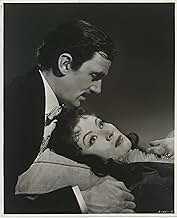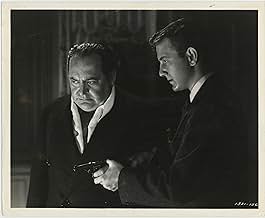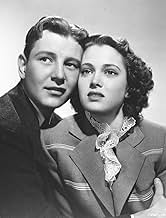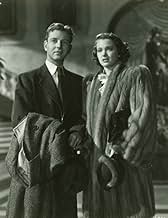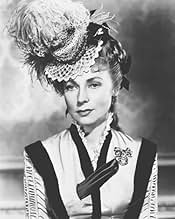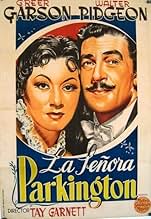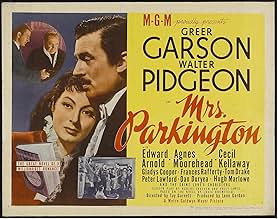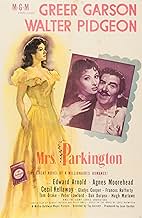Ajouter une intrigue dans votre langueA widowed matriarch reminisces about her family fortunes, including her romance with a financier/mine owner.A widowed matriarch reminisces about her family fortunes, including her romance with a financier/mine owner.A widowed matriarch reminisces about her family fortunes, including her romance with a financier/mine owner.
- Réalisation
- Scénario
- Casting principal
- Nommé pour 2 Oscars
- 4 victoires et 3 nominations au total
St. Luke's Episcopal Church Choristers
- Carolers
- (as Saint Luke's Choristers)
Avis à la une
This is an entertaining family saga from Louis Bromfield's novel, the kind of long, digressive trash wallow that still regularly tops best-seller lists. Essentially a subversive treatise on why inherited wealth is a bad thing, we observe the wealthy Mrs. Parkington as she copes with her selfish, dishonest middle-aged children in 1920s N.Y. while reminiscing about her stormy Gilded Age marriage to her late husband, a Wall Street cutthroat who made a vast fortune.
Greer Garson wears a black wig in this role and -- surprisingly -- it really dims her luster. One misses that hair, so unmistakably red even in black and white, which usually illuminates her face. She also looks too old in the early scenes in which she's meant to be a teenager, and her acting is too arch in her scenes in old age. Even so, she's a suitable and sympathetic figurehead for this limousine ride of a movie. Walter Pidgeon is exactly what the part of the Robber Baron requires: physically imposing and masculine, stubborn and rakish by turns, he is never dynamic but always convincing.
There are several worthwhile points of interest here: In a role that earned her a Supporting Actress Oscar nomination, Agnes Moorehead gives a vivid performance as the French mistress that Parkington insensitively presses into service to make his wife the queen of N.Y. society. Moorehead's efficient acting suggests everything about this woman's precarious existence as well has her combination of artifice and pragmatism. She's like a character out of Trollope. A slightly lesser revelation is Gladys Cooper, cast against type and showing surprising depths of cynicism as a suicidal playgirl. In addition, the film is more frank and relaxed about sexual philandering (both pre-and extra-marital) than one would expect from an MGM film of 1944. And several of the sets, most notably the spectacular rendering of the Parkington mansion on Fifth Avenue (including an entry hall that doubles as a ballroom, complete with two endlessly curving staircases and a colonnade of pillars that leads to a dining hall seating 100) are prime examples of the opulent art direction one routinely enjoys in Hollywood pictures of the '40s.
Finally, although the first third of the film sometimes drags, there are two excellent set pieces that are beautifully constructed and lovingly detailed by director Tay Garnett. The first is a Parkington dinner party to which N.Y.'s 400 are invited -- the pervasive tension and gradual buildup to disaster are really memorable here, as is the use of the film's most impressive set. The second is a very droll bit of drawing room comedy during which Mrs. Parkington meets and enlists the aid of the Prince of Wales to win back her husband from the clutches of an English society hostess. The polite bitchery between the ladies is delightful.
Prospective viewers can decide if this list of pleasures justifies a look at this luxe movie.
Greer Garson wears a black wig in this role and -- surprisingly -- it really dims her luster. One misses that hair, so unmistakably red even in black and white, which usually illuminates her face. She also looks too old in the early scenes in which she's meant to be a teenager, and her acting is too arch in her scenes in old age. Even so, she's a suitable and sympathetic figurehead for this limousine ride of a movie. Walter Pidgeon is exactly what the part of the Robber Baron requires: physically imposing and masculine, stubborn and rakish by turns, he is never dynamic but always convincing.
There are several worthwhile points of interest here: In a role that earned her a Supporting Actress Oscar nomination, Agnes Moorehead gives a vivid performance as the French mistress that Parkington insensitively presses into service to make his wife the queen of N.Y. society. Moorehead's efficient acting suggests everything about this woman's precarious existence as well has her combination of artifice and pragmatism. She's like a character out of Trollope. A slightly lesser revelation is Gladys Cooper, cast against type and showing surprising depths of cynicism as a suicidal playgirl. In addition, the film is more frank and relaxed about sexual philandering (both pre-and extra-marital) than one would expect from an MGM film of 1944. And several of the sets, most notably the spectacular rendering of the Parkington mansion on Fifth Avenue (including an entry hall that doubles as a ballroom, complete with two endlessly curving staircases and a colonnade of pillars that leads to a dining hall seating 100) are prime examples of the opulent art direction one routinely enjoys in Hollywood pictures of the '40s.
Finally, although the first third of the film sometimes drags, there are two excellent set pieces that are beautifully constructed and lovingly detailed by director Tay Garnett. The first is a Parkington dinner party to which N.Y.'s 400 are invited -- the pervasive tension and gradual buildup to disaster are really memorable here, as is the use of the film's most impressive set. The second is a very droll bit of drawing room comedy during which Mrs. Parkington meets and enlists the aid of the Prince of Wales to win back her husband from the clutches of an English society hostess. The polite bitchery between the ladies is delightful.
Prospective viewers can decide if this list of pleasures justifies a look at this luxe movie.
This was an entertaining movie, told in both contemporary time and flashback, as Susie Parkington (Greer Garson) recalls her life with her late husband, Augustus (Walter Pidgeon), while dealing with a family crisis that involves all her self-centered children, grandchildren, in-laws and her beloved great-granddaughter, who adds substance to the shallow brood.
Greer is terrific and the character she plays is admirable and likeable, but the same can't be said for Walter, as Augustus can't be called admirable. He's got an ego to match his bank account as well as a vengeful streak that borders on obsessive. Despite being a young, innocent woman (as well as his social inferior) when they wed (he felt responsible for her, as the mining accident he indirectly caused resulted in her mother's death) she manages to hold her own against this strong, often domineering man, like when she confesses to lending financial help to the family of a business rival he sought to destroy. She also stands her ground when it comes to Aspasia (Agnes Moorehead), Augustus's former mistress, who becomes Susie's friend, though still in love with her husband. Later down the road, after a year's separation caused by a family tragedy, Susie follows Augustus to Europe, where she wins him back from another woman, with help from the Prince of Wales! She's more than a match for the husband who called her "Sparrow"!
There are other familiar faces here: Edward Arnold, Dan Duryea, Cecil Kellaway, that add to the story, though I would have been just as happy had the present-day clan been left out altogether.
Greer is terrific and the character she plays is admirable and likeable, but the same can't be said for Walter, as Augustus can't be called admirable. He's got an ego to match his bank account as well as a vengeful streak that borders on obsessive. Despite being a young, innocent woman (as well as his social inferior) when they wed (he felt responsible for her, as the mining accident he indirectly caused resulted in her mother's death) she manages to hold her own against this strong, often domineering man, like when she confesses to lending financial help to the family of a business rival he sought to destroy. She also stands her ground when it comes to Aspasia (Agnes Moorehead), Augustus's former mistress, who becomes Susie's friend, though still in love with her husband. Later down the road, after a year's separation caused by a family tragedy, Susie follows Augustus to Europe, where she wins him back from another woman, with help from the Prince of Wales! She's more than a match for the husband who called her "Sparrow"!
There are other familiar faces here: Edward Arnold, Dan Duryea, Cecil Kellaway, that add to the story, though I would have been just as happy had the present-day clan been left out altogether.
Greer Garson lived to be 91 years old, and she never looked as she did as the older Mrs. Parkington and the older Madame Curie - all white.
In this 1944 film, the Parkington family meets for Christmas, just before they all learn of a scandal which will impact the family fortune and the reputation of the family.
Thinking about her husband, Susie (Greer Garson), the matriarch, now 84, thinks back to meeting her husband Gus (Walter Pidgeon) at her family boarding house in Leaping Frog, Nevada. The major, as he was called, owned the mine where everyone worked.
Susie had always dreamed of being in high society, and she knew all about it and would fantasize about what it would be like. She gets her wish when, after the loss of her mother when the mine caves in, the Major and Susie marry and go to New York.
There she meets Aspasia (Agnes Moorhead), the Major's former mistress, who takes Susie in hand and helps her to buy clothes and learn the ways of society. Susie and the Major have children and encounter tragedy and separation. With the Major gone now, Susie reflects on how best to handle this situation by asking herself what the Major would do.
Really lovely film, with fine performances by Moorhead, Pidgeon, and of course, Garson. In the beginning she sports a black wig; I kind of missed, even in black and white, her flaming red hair. Strangely, Gladys Cooper plays Garson's daughter when Mrs. Parkington was 84. Cooper was 16 years older in reality.
In those days, it was more economical for studios to use actresses under contract than borrow someone (though lending actors out was incredibly lucrative). Possibly Cooper was under contract and available.
The film also features Edward Arnold, Dan Duryea, Lee Patrick, Tom Drake, Hugh Marlowe, Hans Conried, with Peter Lawford in a tiny role.
Good movie.
In this 1944 film, the Parkington family meets for Christmas, just before they all learn of a scandal which will impact the family fortune and the reputation of the family.
Thinking about her husband, Susie (Greer Garson), the matriarch, now 84, thinks back to meeting her husband Gus (Walter Pidgeon) at her family boarding house in Leaping Frog, Nevada. The major, as he was called, owned the mine where everyone worked.
Susie had always dreamed of being in high society, and she knew all about it and would fantasize about what it would be like. She gets her wish when, after the loss of her mother when the mine caves in, the Major and Susie marry and go to New York.
There she meets Aspasia (Agnes Moorhead), the Major's former mistress, who takes Susie in hand and helps her to buy clothes and learn the ways of society. Susie and the Major have children and encounter tragedy and separation. With the Major gone now, Susie reflects on how best to handle this situation by asking herself what the Major would do.
Really lovely film, with fine performances by Moorhead, Pidgeon, and of course, Garson. In the beginning she sports a black wig; I kind of missed, even in black and white, her flaming red hair. Strangely, Gladys Cooper plays Garson's daughter when Mrs. Parkington was 84. Cooper was 16 years older in reality.
In those days, it was more economical for studios to use actresses under contract than borrow someone (though lending actors out was incredibly lucrative). Possibly Cooper was under contract and available.
The film also features Edward Arnold, Dan Duryea, Lee Patrick, Tom Drake, Hugh Marlowe, Hans Conried, with Peter Lawford in a tiny role.
Good movie.
Greer Garson and Walter Pidgeon turn in fine performances here, in fact, they're as good here as in any of their films. Garson has long been a favorite of mine, and I particularly revere her performance in "Random Harvest". This film isn't quite that good, but it is a gem.
Of particular interest here are two very unusual performances by supporting actors. When I read, in advance, that Agnes Moorehead played a French socialite...well, I just couldn't see it. But, she was wonderful, and this is an Agnes Moorehead you've never seen before! And Cecil Kellaway as Edward, Prince of Wales...again, a very different performance, and so well done.
The story itself is interesting, with Garson as an old family institution reflecting on her life. If there's a criticism about this film, it's that Garson looks too young even in her elderly makeup. But, for much of the movie, she's her usual alluring self. Is it a sentimental melodrama? Yes. But a delightful one.
Of particular interest here are two very unusual performances by supporting actors. When I read, in advance, that Agnes Moorehead played a French socialite...well, I just couldn't see it. But, she was wonderful, and this is an Agnes Moorehead you've never seen before! And Cecil Kellaway as Edward, Prince of Wales...again, a very different performance, and so well done.
The story itself is interesting, with Garson as an old family institution reflecting on her life. If there's a criticism about this film, it's that Garson looks too young even in her elderly makeup. But, for much of the movie, she's her usual alluring self. Is it a sentimental melodrama? Yes. But a delightful one.
This appears at first to be a familiar kind of opulent family-through-the-generations saga. And Greer Garson was one of the queens of the genre.
But underlying this throughout is a droll, adult subtle wit. And the stylish stars to deliver it. There are those fairly subtle remarks which make the attractive guest smirk and the wife glare at her husband, all of whom are bound by the rules of politeness never to directly say what is, we so gather, very much going on. Remarks intended to indicate just to husband and wife that the attractive guest knows more about the husband's likes and dislikes than does his wife. They are such that other guests - and possibly some viewers - would be unaware of the true state of play. Fully adult themes with never a glimpse of stocking.
I didn't intend watching this but just heard the small bit of banter from actor Cecil Kellaway(as the Prince of Wales) who has a surprise meeting with Mrs Parkington. Rarely have I heard words spoken with, how to say it, a more skillful modulation. The speaker, who Mrs Parkington fails to recognise, is no ordinary person. The same thing could be said about the film.
But underlying this throughout is a droll, adult subtle wit. And the stylish stars to deliver it. There are those fairly subtle remarks which make the attractive guest smirk and the wife glare at her husband, all of whom are bound by the rules of politeness never to directly say what is, we so gather, very much going on. Remarks intended to indicate just to husband and wife that the attractive guest knows more about the husband's likes and dislikes than does his wife. They are such that other guests - and possibly some viewers - would be unaware of the true state of play. Fully adult themes with never a glimpse of stocking.
I didn't intend watching this but just heard the small bit of banter from actor Cecil Kellaway(as the Prince of Wales) who has a surprise meeting with Mrs Parkington. Rarely have I heard words spoken with, how to say it, a more skillful modulation. The speaker, who Mrs Parkington fails to recognise, is no ordinary person. The same thing could be said about the film.
Le saviez-vous
- AnecdotesUnusual for a film even today, the movie was shot in chronological order.
- GaffesThe gypsy fiddler plays Johann Strauss's "Roses from the South" on violin in a scene set in 1872, but that music was written in 1880.
- Citations
Susie 'Sparrow' Parkington: Why did you marry me?
Major Augustus Parkington: Life was too simple without you.
- Versions alternativesIn the European released version, Cecil Kellaway was replaced by 'Hugo Haas' and the role was changed to "Balkan King." Also, Tala Birell's character was changed to simply "Countess" instead of "Lady Norah Ebbsworth." Three actors in casting call lists but who were not in the U.S. print (Ann Codee, George Davis and Frank Reicher may also have been in this version (see the trivia section.)
- ConnexionsFeatured in Twenty Years After (1944)
- Bandes originalesI'll Take You Home Again, Kathleen
(1876) (uncredited)
Music by Thomas Payne Westendorf
Played extensively in the score, mostly as a love theme
Meilleurs choix
Connectez-vous pour évaluer et suivre la liste de favoris afin de recevoir des recommandations personnalisées
Everything New on HBO Max in August
Everything New on HBO Max in August
Looking for something different to add to your Watchlist? Take a peek at what movies and TV shows are coming to HBO Max this month.
- How long is Mrs. Parkington?Alimenté par Alexa
Détails
- Date de sortie
- Pays d’origine
- Langue
- Aussi connu sous le nom de
- La señora Parkington
- Lieux de tournage
- Morrison Ranch, Agoura, Californie, États-Unis(fox hunt sequence)
- Société de production
- Voir plus de crédits d'entreprise sur IMDbPro
- Durée
- 2h 4min(124 min)
- Couleur
- Rapport de forme
- 1.37 : 1
Contribuer à cette page
Suggérer une modification ou ajouter du contenu manquant


